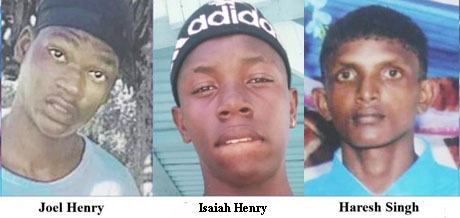President Irfaan Ali on Thursday said the police would advise him on whether additional help is needed in the investigations into the murders West Coast Berbice (WCB) teenagers Isaiah and Joel Henry and Haresh Singh.
“…The police would advise me on what additional help is needed and I have told the police that whatever additional help they need and we can facilitate, we will,” Ali told reporters at State House.
He had been asked whether the government will be accepting the offer of assistance from the Argentine Team of Forensic Anthropology (EAAF).
Ali said that the government has already facilitated a team from the Caribbean Community’s Implementation Agency for Crime and Security (CARICOM IMPACS) and the Regional Security System (RSS).
He added that he is aware that in “some” component of the investigations, the police have also reached out to the Federal Bureau of Investigation (FBI). This, he said, is a “continued” collaboration.
“The investigation is ongoing and the police would determine and advise me on what additional help is needed,” Ali said.
The president has previously promised that no stone would be left unturned in finding those responsible for the killing.
Isaiah, 16, a student at the Woodley Park Secondary School, and Joel, 18, who worked at the Blairmont Estate, went missing on Saturday, September 5, after they left home for the Cotton Tree backlands to pick coconuts.
Their mutilated bodies were found the next day during a search, sparking days of unrest in West Berbice. Days after, another teenager, Singh, was also murdered in what is believed to be a reprisal killing.
Director of EAAF Dr Luis Fondebrider recently visited Guyana to assess whether the team is capable of supporting local police in the probes.
During his five-day visit, DrFondebrider met with the families or the teenagers, visited the crime scene and the Georgetown Public Hospital (GPH) mortuary and met with Minister of Home Affairs Robeson Benn and senior members of the Guyana Police Force (GPF), including Crime Chief Wendell Blanhum.
Before his departure, Dr Fondebrider told reporters on Tuesday that he requested a list of 20 documents from the police in order to offer advice on solving the murders.
Dr Fondebrider had said that he would only be in a position to provide recommendations and advice on the probes once the documents are provided to him.
“I need documents. I need reports from the crime scene, from the autopsy, the complete analysis. I don’t have it……I told them very clearly what I need. I need documents from the work of the crime scene, I need to see pictures, maps, the scriptures, to which labs were the samples taken from the bodies from the scene sent, I need to see the autopsy reports, how long it took the autopsy, the condition of the mortuary. Only with that information, after re-analysing, I can offer opinion and advice,” he explained.
It remains unclear whether those documents have been or will be provided to him.
In early October, the GPF, the Guyana Human Rights Association (GHRA) and the law firm Hughes, Fields & Stoby had announced that the EAAF team had offered to aid local authorities with the investigations.
In a joint statement, they had said that the team, which has worked on high profile cases in many parts of the world, offered to send a team to Guyana, including a forensic pathologist, a forensic anthropologist, a forensic radiologist and a criminalist.
The GHRA remains hopeful that once the EAAF can assist with the probes, the government will be willing to offer financial support in having the team here.
In September, CARICOM IMPACS and RSS visited to assist local police with the investigations.
Ali had taken a decision to have the team here after dozens of ranks combed the backlands of No. 2 and No. 3 villages, WCB and found nothing of “evidential” value for the investigation into the murders.
Following their departure, a report was prepared. While the findings were not made public, Ali had also told the media that the RSS team has recommended additional work be done.
Dr Fondebrider is expected to compile a report on his visit, which will be handed over to the GHRA upon completion.
He explained that the report is likely to take a period of three weeks to be prepared if the documents are provided in a timely manner. “Without those documents, it will be a very short report about my activities,” he added.










